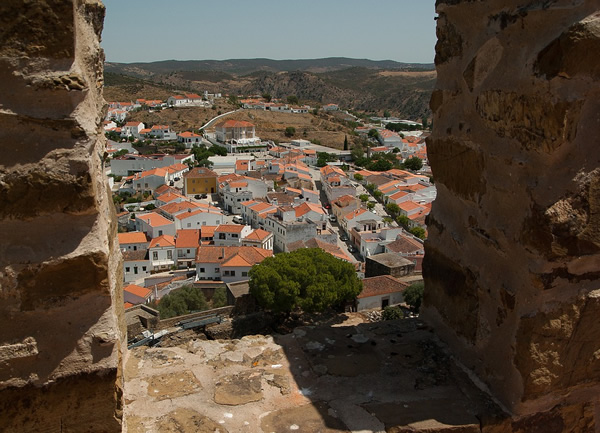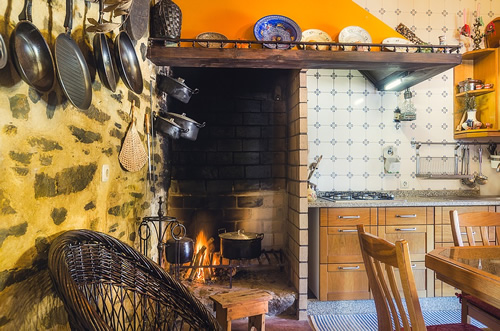The Real Portugal
Experience Tradition and Preserve the Countryside with Historic Homestays
By Volker Poelzl

Medieval towns, often with an old castle or two, dot the Portugese landscape.
Portugal is a quiet and peaceful country with a subtle beauty that takes time to discover and appreciate. Its countryside, dotted with medieval castles, ruins, manor houses, and churches, beckons visitors to step back in time to days gone by. But the country's long and turbulent history is not merely a thing of the past; it lives on in Portugal's magnificent cultural heritage and in the lives and traditions of its hospitable people.
Faced with their decaying manor houses and historic homes, property owners decided to build on their rich culture and hospitality by restoring and opening them up to paying guests. But staying in one of Portugal's restored homes is much more than accommodation in a quaint old building. Most of the homes are hundreds of years old and host an impressive collection of art and antiques, with decor and antique furnishings that often reflect the period in which they were built. Some of the manor houses are the former countryseats of the Portuguese aristocracy and have often been in the hands of the same family for generations. All homes are privately owned and operated, and the owners live on their properties, which makes for personable service and the opportunity to experience daily Portuguese life. Visitors have the opportunity to spend time with their hosts and share meals with the family.
The Portuguese pride themselves in their regional cooking traditions, and your hosts will be delighted to prepare some of the best their region has to offer, from specialty cheeses and smoked meats and sausages to hearty soups and meat dishes. You may also be offered the regional wine and spoiled with the hostess's favorite sweets and pastries. Whether the home is a rustic farmhouse with a small herd of sheep, a working agricultural farm or a wine estate, visitors have the opportunity to learn about the traditional ways of working the land, harvesting fruit, and making wine.

Inside the kitchen of an old house in Portugal.
Homestays as an Alternative to Mass Tourism
Homestays are a unique alternative to the horrendous tourism development along Portugal's Algarve coast, which has transformed many of the sleepy fishing villages into concrete tourist ghettos. Much of the original charm is gone, and the beach resorts resemble those in every other country of southern Europe's sun belt. Homestays on the other hand blend in with the local way of life and support the local economy in areas often affected by depopulation and lack of jobs. By staying at a historic mansion or country home, visitors contribute to the preservation of Portugal's rich architectural heritage. Many of the homes were renovated through grants and loans for the specific purpose of hosting visitors, and thanks to them the once dilapidated and neglected structures show their historic facades in renewed splendor and are once again the pride of their owners.
Homestays also promote ecological sustainability. With small numbers of accommodations distributed over a large area, the visitors' impact remains small. No new freeways and hotel complexes spoil the landscape, and instead of concrete cubes with impersonal service, visitors stay in real homes with real families.
With a few exceptions the restored manor houses and historic homes are far away from popular tourist destinations, and their out-of-the-way location enables visitors to explore some of Portugal's most beautiful mountains and nature parks, providing great recreational opportunities off the beaten path. Their location in northern and central Portugal, especially in the northern Minho province — Portugal's historic heartland — also allows the traveler to experience more Portuguese culture. In these regions locals are still closer bound by their traditions, and life has changed very little, despite Portugal's ongoing modernization. Fairs, festivals, and pilgrimages are popular, and folkloric and religious festivals with dance and music are also widely celebrated. Make sure you ask your hosts about these events.
Selecting a Homestay in Portugal
There are several associations that represent different types of homestays and help visitors make the best choices:
Solares de Portugal is a trademark of TURIHAB (Association of Residential Tourism), a government umbrella organization that promotes homestays in historic properties with emphasis on regional hospitality and preservation of the local cultural, historical, and architectural heritage. Solares de Portugal includes three different categories of homes, each with different prices. Casas antigas (historic houses) are stately manor houses and countryseats; Quintas and Heredas are agricultural farms and country houses; Casas Rusticas are restored cottages and small farmhouses. A minimum stay of three nights is required. Prices range for a double room from €75 to €150 year-round, now quite often including WiFi and other modern conveniences, with breakfast included. TURIHAB represents more than 100 privately owned historic homes, estates, and country houses. It enforces strict quality control of Solares de Portugal members.
For general information about Portugal contact the Portuguese National Tourism Office (Visit Portugal).
Volker Poelzl is the author of Culture Shock! Portugal. On his extensive travels throughout Portugal, he has enjoyed staying in rustic farmhouses and elegant estates, seeking contact with the locals and experiencing regional traditions and culture.
|
